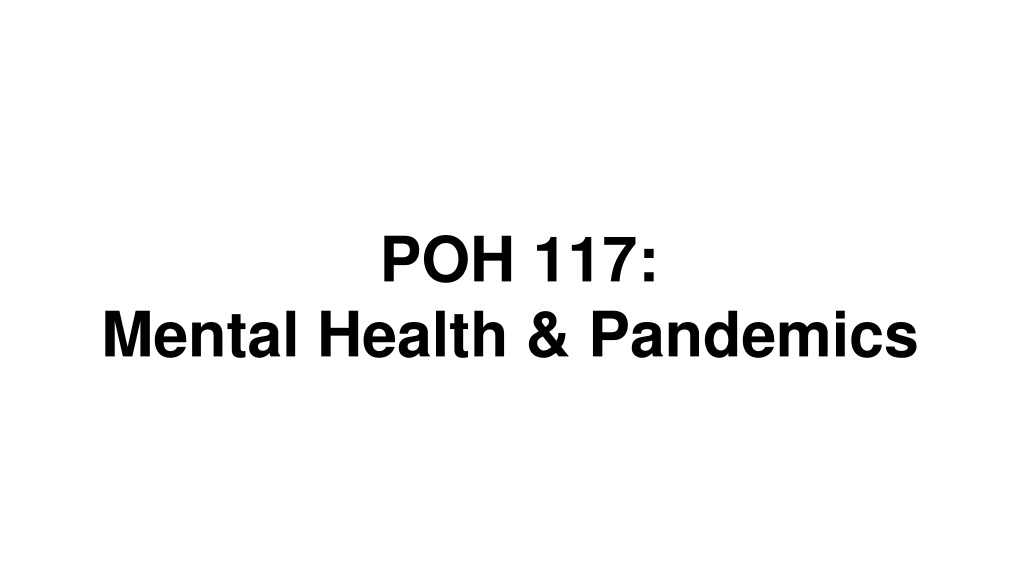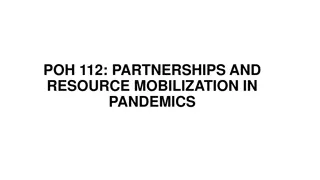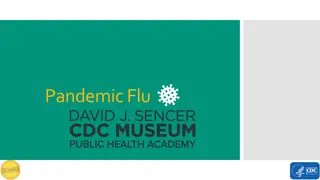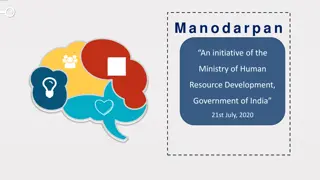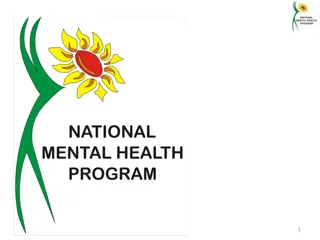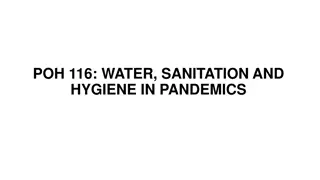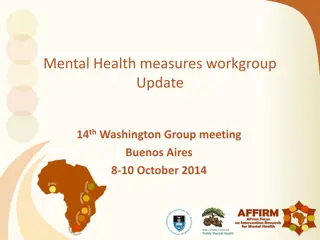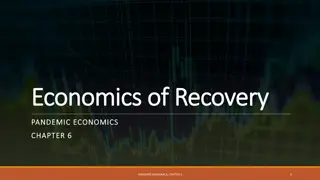Understanding Mental Health and Pandemics
This module delves into mental health terminology, the impact of pandemics on mental well-being, identifying mental distress, tools for prevention and response, and providing support during acute phases of mental health issues. Learners will gain knowledge on various concepts related to mental health, stressors, and conditions affecting mental well-being, ultimately enabling them to recognize, manage, and support those experiencing mental distress in communities.
Download Presentation

Please find below an Image/Link to download the presentation.
The content on the website is provided AS IS for your information and personal use only. It may not be sold, licensed, or shared on other websites without obtaining consent from the author. Download presentation by click this link. If you encounter any issues during the download, it is possible that the publisher has removed the file from their server.
E N D
Presentation Transcript
POH 117: Mental Health & Pandemics
Module Objectives This module sets out to: i. Define terms and concepts used in the mental health field. ii. Identify causes, risks and impact of mental distress during pandemics. iii. Recognize mental distress in communities. iv. Utilize tools to prevent and respond to mental distress including mental health care in the acute phase.
Expected Learning Outcomes By the end of this module, learners should be able to: Explain common terms and concepts in mental health. i. ii. Describe the stressors, factors and conditions that impact mental health during pandemics and identify populations at risk of increased mental health distress. iii. Utilize tools used in identification and response to mental distress and describe barriers to their implementation. iv. Map out mental health support and provide response in the acute phase of mental distress.
Definition of Terminologies & Concepts mental health: includes our emotional, psychological, and social well-being. It affects how we think, feel, and act. It also helps determine how we handle stress, relate to others, and make healthy choices (CDC) stress: any type of change that causes physical, emotional or psychological strain. Stress is your body's response to anything that requires attention or action (WHO) emotional distress: a highly unpleasant emotional reaction (as anguish, humiliation, or fury) which results from another's conduct and for which damages may be sought (legal definition; merriam webster) human rights violations arbitrary deprivation of life; torture, cruel or degrading treatment or punishment; slavery and forced labour; arbitrary arrest or detention; arbitrary interference discrimination; and advocacy of racial or religious hatred with privacy; war propaganda;
Definition of Terminologies & Concepts anxiety: anxiety is an emotion characterized by feelings of tension, worried thoughts, and physical changes like increased blood pressure (APA) depression: depression is a mood disorder that causes a persistent feeling of sadness and loss of interest (mayo clinic) post-traumatic stress disorder: nightmares and flashbacks, and may experience feelings of isolation, irritability and guilt (NHS) psychological first aid: an evidence-informed modular approach to help people in the immediate aftermath of disaster and terrorism sexual and gender-based violence. It is is designed to reduce the initial distress caused by traumatic events and to foster short- and long-term adaptive functioning and coping reliving a traumatic event through
Stressors & Conditions that Impact Mental Health Death of loved ones Isolation Loss of employment Illness Fear Poverty Myths around communicable diseases Comorbid conditions Displacement Stigmatization Others?
Populations at Risk Those with preexisting conditions The impoverished Those with genetic predisposition Extremes of age Women People living with disabilities (PLWD) People with drugs substance abuse (DSA) Those in quarantine The stigmatized
Tools in Diagnosis of Mental Health Problems Depression Anxiety Stress Scale (DASS) Generalized Anxiety Disorder Screener (GAD-7) Addiction Severity Index (ASI) Post-Traumatic Stress Disorder Checklist Behavioral Assessment Tools Revised Children's Anxiety and Depression Scale (RCADS) **To have copies of each tool for breakout groups
Support Tools in Managing Mental Health Conditions & Referral Psychologist Psychiatrist Medications Telehealth Government programs Support groups Employee assistance programs Alcohol and drug abuse (ADA) clinics Social protection Digital mental health tools Self-care Support of health workers Coping mechanisms
Psycho-social Support Normal reactions to abnormal events Five principles of psychosocial support (ensure and promote safety, calm, personal and collective efficacy, connectedness, hope) Psychosocial support activities Psychological first aid (prepare, look, listen, link) including at the household level
Case Studies Get into groups of 4 and read your assigned paper on a specific population and mental health. Prepare a 10 minute Case Study presentation for the class and facilitate a 20 minute discussion on your assigned population. 1. Healthcare Workers (Henneman J et al. 2021. The impact of the COVID-19 pandemic on the mental health of medical staff considering the interplay of pandemic burden and psychosocial resources A rapid systematic review. PLoS ONE) 2. Students (Chen T & Lucock M. 2022. The mental health of university students during the COVID-19 pandemic: An online survey in the UK. PLoS ONE) 3. Families (Gadermann A et al. 2021 Examining the impacts of the COVID-19 pandemic on family mental health in Canada: findings from a national cross- sectional study. BMJ Open) 4. People with existing mental health concerns (Pan K-Y et al. 2021). The mental health impact of the COVID-19 pandemic on people with and without depressive, anxiety, or obsessive-compulsive disorders: a longitudinal study of three Dutch case-control cohorts The Lancet Psychiatry)
Group Discussion Break out into groups of 3-4 and discuss the below questions: 1. What is the link between pandemics and mental health? 2. How can mental health be promoted during a pandemic? 3. How can you offer mental health support to family, friends and colleagues during a pandemic? 4. Has COVID-19 changed how we are talking about mental health?
References 1. Chen J, Farah N, Dong RK, Chen RZ, Xu W, Yin J, Chen BZ, Delios AY, Miller S, Wan X, Ye W, Zhang SX. Mental Health during the COVID-19 Crisis in Africa: A Systematic Review and Meta-Analysis. Int J Environ Res Public Health. 2021 Oct 10; 18(20):10604. doi: 10.3390/ijerph182010604. 2. Galea S, Merchant RM, Lurie N. The Mental Health Consequences of COVID-19 and Physical Distancing: The Need for Prevention and Early Intervention. doi:10.1001/jamainternmed.2020.1562 3. IASC Guidelines for Mental Health and Psychosocial Support in Emergency Settings (https://interagencystandingcommittee.org/mental-health-and-psychosocial-supportemergency-settings- 0/documents-public/iasc-guidelines-mental) 4. IASC Inter-Agency Referral Guidance Note for Mental Health and Psychosocial Support in Emergency Settings (https://interagencystandingcommittee.org/mental-health-and-psychosocial-supportemergency- settings/content/iasc-inter-agency-referral) 5. Mental health preparedness and response for the COVID-19 pandemic. Report by the Director General of the World Health Organization. (https://apps.who.int/gb/ebwha/pdf_files/EB148/B148_20-en.pdf) 6. Psychological First Aid (https://www.who.int/mental_health/publications/guide_field_workers/en/ JAMA Intern Med. 2020;180(6):817 818. January 8 2021. EB148/20
Review of The Pandemic Preparedness with One Health approach (PPOH) short course is by the East African Community (EAC) Secretariat in cooperation with universities of the six EAC Partner States. It is facilitated by the German Government and implemented by the Deutsche Gesellschaft f r Internationale Zusammenarbeit GIZ GmbH through the Global Programme Pandemic Prevention and Response, One Health (GP PPOH)
